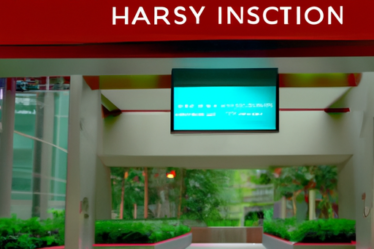
The Importance of Proactive Prospecting in Achieving Hotel Sales Goals
Transitioning to “Sales Hunting”: Achieve Your Hotel’s 2024 Sales Goals through Proactive Prospecting
In the fast-paced and competitive world of the hotel industry, achieving sales goals is crucial for success. As we approach the year 2024, it’s time for hotels to shift their focus from reactive sales strategies to proactive prospecting. This article will explore the importance of proactive prospecting in achieving hotel sales goals and provide valuable insights on how to make this transition successfully.
Proactive prospecting involves actively seeking out potential customers and initiating contact, rather than waiting for them to come to you. This approach allows hotels to take control of their sales efforts and create opportunities for growth. By identifying and targeting specific market segments, hotels can tailor their sales pitches and offerings to meet the unique needs and preferences of potential customers.
One of the key benefits of proactive prospecting is the ability to build and nurture relationships with potential customers. By reaching out to them directly, hotels can establish a personal connection and demonstrate their commitment to providing exceptional service. This personal touch goes a long way in building trust and loyalty, which are essential for long-term business relationships.
Another advantage of proactive prospecting is the ability to stay ahead of the competition. In a saturated market, hotels that wait for customers to come to them risk losing out to more proactive competitors. By actively seeking out potential customers, hotels can position themselves as industry leaders and differentiate themselves from the competition. This proactive approach also allows hotels to identify emerging trends and adapt their offerings accordingly, ensuring they stay relevant and appealing to customers.
To successfully transition to proactive prospecting, hotels need to invest in the right tools and resources. This includes implementing a customer relationship management (CRM) system to track and manage leads, as well as training sales teams on effective prospecting techniques. By equipping sales teams with the necessary skills and tools, hotels can maximize their chances of success in the proactive prospecting journey.
In addition to investing in resources, hotels should also prioritize data analysis and market research. By analyzing customer data and market trends, hotels can identify potential opportunities and tailor their prospecting efforts accordingly. This data-driven approach allows hotels to make informed decisions and allocate resources effectively, increasing the likelihood of achieving sales goals.
Furthermore, hotels should consider leveraging technology to enhance their proactive prospecting efforts. This includes utilizing social media platforms, email marketing, and online advertising to reach a wider audience and generate leads. By embracing digital marketing strategies, hotels can expand their reach and engage with potential customers in a cost-effective and efficient manner.
In conclusion, transitioning to proactive prospecting is essential for hotels looking to achieve their sales goals in 2024. By actively seeking out potential customers, building relationships, and staying ahead of the competition, hotels can position themselves for success in a competitive market. Investing in the right tools, resources, and technology, as well as prioritizing data analysis and market research, are key steps in making this transition successfully. With a proactive prospecting approach, hotels can unlock new opportunities, drive revenue growth, and create lasting business relationships.
Strategies for Successful Sales Hunting in the Hotel Industry

Transitioning to “Sales Hunting”: Achieve Your Hotel’s 2024 Sales Goals through Proactive Prospecting
In the competitive world of the hotel industry, staying ahead of the game is crucial. As we approach 2024, it’s time to start thinking about how to achieve your hotel’s sales goals for the upcoming year. One strategy that has proven to be highly effective is sales hunting – a proactive approach to prospecting that can yield impressive results. In this article, we will explore some strategies for successful sales hunting in the hotel industry.
First and foremost, it’s important to understand what sales hunting entails. Unlike traditional sales methods that rely on waiting for leads to come to you, sales hunting involves actively seeking out potential customers. This proactive approach allows you to target specific markets and individuals who are most likely to be interested in your hotel’s offerings. By taking the initiative, you can increase your chances of closing deals and achieving your sales goals.
To begin your sales hunting journey, it’s essential to identify your target market. Who are the individuals or groups that are most likely to be interested in your hotel? Are you targeting business travelers, families, or perhaps a specific niche market? By understanding your target market, you can tailor your sales efforts to meet their specific needs and preferences. This targeted approach will not only increase your chances of success but also save you time and resources.
Once you have identified your target market, it’s time to start prospecting. This involves actively seeking out potential customers through various channels. One effective strategy is to leverage social media platforms such as LinkedIn, Facebook, and Instagram. These platforms allow you to connect with potential customers, showcase your hotel’s unique offerings, and engage with them on a personal level. By building relationships and establishing trust, you can increase the likelihood of converting prospects into paying customers.
In addition to social media, attending industry events and trade shows can also be a fruitful prospecting strategy. These events provide an opportunity to network with industry professionals, showcase your hotel’s offerings, and generate leads. By actively participating in these events, you can position yourself as an industry expert and build valuable connections that can lead to future business opportunities.
Another effective strategy for successful sales hunting is to leverage technology. With the advancement of technology, there are numerous tools and software available that can streamline your prospecting efforts. For example, customer relationship management (CRM) software can help you track and manage your leads, ensuring that no potential customer falls through the cracks. Additionally, email marketing automation tools can help you stay in touch with prospects, nurturing the relationship and increasing the chances of conversion.
Lastly, it’s important to continuously evaluate and refine your sales hunting strategies. What is working well? What can be improved? By regularly analyzing your efforts and making necessary adjustments, you can optimize your prospecting process and achieve better results. This may involve experimenting with different channels, refining your messaging, or investing in additional training for your sales team. Remember, sales hunting is an ongoing process that requires adaptability and a willingness to learn and grow.
In conclusion, transitioning to sales hunting can be a game-changer for your hotel’s sales goals in 2024. By taking a proactive approach to prospecting, targeting your efforts, leveraging technology, and continuously refining your strategies, you can increase your chances of success in the competitive hotel industry. So, start planning your sales hunting journey today and get ready to achieve your sales goals in the upcoming year.
How to Transition to Sales Hunting and Drive Revenue Growth in Your Hotel
Transitioning to “Sales Hunting”: Achieve Your Hotel’s 2024 Sales Goals through Proactive Prospecting
In the ever-evolving world of hospitality, it is crucial for hotels to stay ahead of the game and continuously find new ways to drive revenue growth. One effective strategy that has gained popularity in recent years is transitioning from a reactive sales approach to a proactive one, also known as “sales hunting.” By actively seeking out new business opportunities and engaging in proactive prospecting, hotels can position themselves for success and achieve their sales goals for 2024.
So, how can your hotel make the transition to sales hunting and drive revenue growth? Let’s explore some key steps and strategies that can help you get started.
First and foremost, it is essential to understand the difference between reactive sales and proactive sales hunting. Reactive sales involve waiting for leads to come in and then responding to them. While this approach may yield some results, it often leaves hotels at the mercy of market conditions and the competition. On the other hand, proactive sales hunting involves actively seeking out new business opportunities and taking the initiative to engage with potential clients.
To transition to sales hunting, it is crucial to build a strong foundation by defining your target market and identifying your ideal customers. Conduct market research to understand the needs and preferences of your target audience. This will enable you to tailor your sales efforts and prospecting strategies to attract the right clients.
Once you have a clear understanding of your target market, it’s time to develop a proactive prospecting plan. This plan should outline the specific actions you will take to identify and engage with potential clients. Consider leveraging various channels such as social media, industry events, and networking opportunities to expand your reach and connect with decision-makers in your target market.
In addition to traditional prospecting methods, it is also essential to embrace technology and leverage digital tools to enhance your sales hunting efforts. Invest in a customer relationship management (CRM) system to track and manage your leads effectively. This will enable you to stay organized, follow up with prospects, and nurture relationships over time.
Furthermore, consider implementing marketing automation tools to streamline your prospecting process. These tools can help you automate repetitive tasks, such as sending personalized emails and tracking prospect engagement. By automating these tasks, you can focus your time and energy on building relationships and closing deals.
Another crucial aspect of transitioning to sales hunting is training and empowering your sales team. Provide them with the necessary tools, resources, and training to excel in their proactive prospecting efforts. Encourage them to think outside the box, be creative, and take ownership of their sales goals. Foster a culture of continuous learning and improvement, where your team feels supported and motivated to achieve success.
Lastly, it is essential to measure and track the effectiveness of your sales hunting efforts. Set clear goals and key performance indicators (KPIs) to monitor your progress. Regularly review and analyze your sales data to identify areas for improvement and make data-driven decisions. By continuously evaluating and adjusting your strategies, you can optimize your sales hunting approach and drive revenue growth in your hotel.
In conclusion, transitioning to sales hunting is a powerful strategy that can help hotels achieve their sales goals for 2024 and beyond. By proactively seeking out new business opportunities, engaging in proactive prospecting, and leveraging technology, hotels can position themselves for success in the competitive hospitality industry. Remember to define your target market, develop a proactive prospecting plan, empower your sales team, and measure your results. With a proactive mindset and a well-executed sales hunting strategy, your hotel can drive revenue growth and thrive in the years to come.


